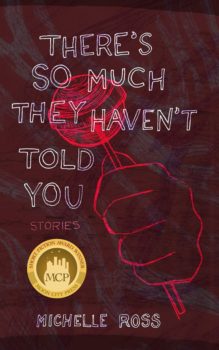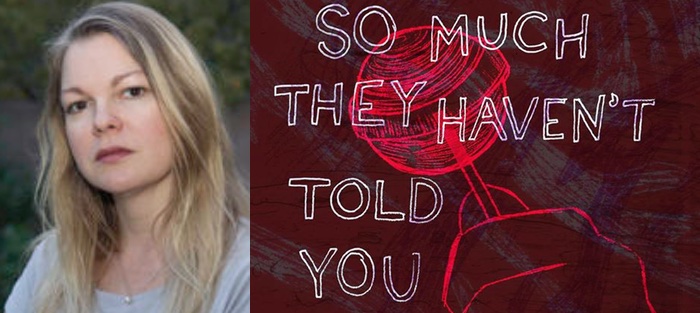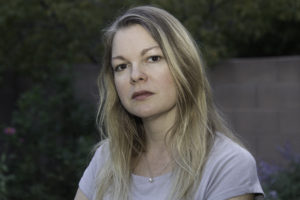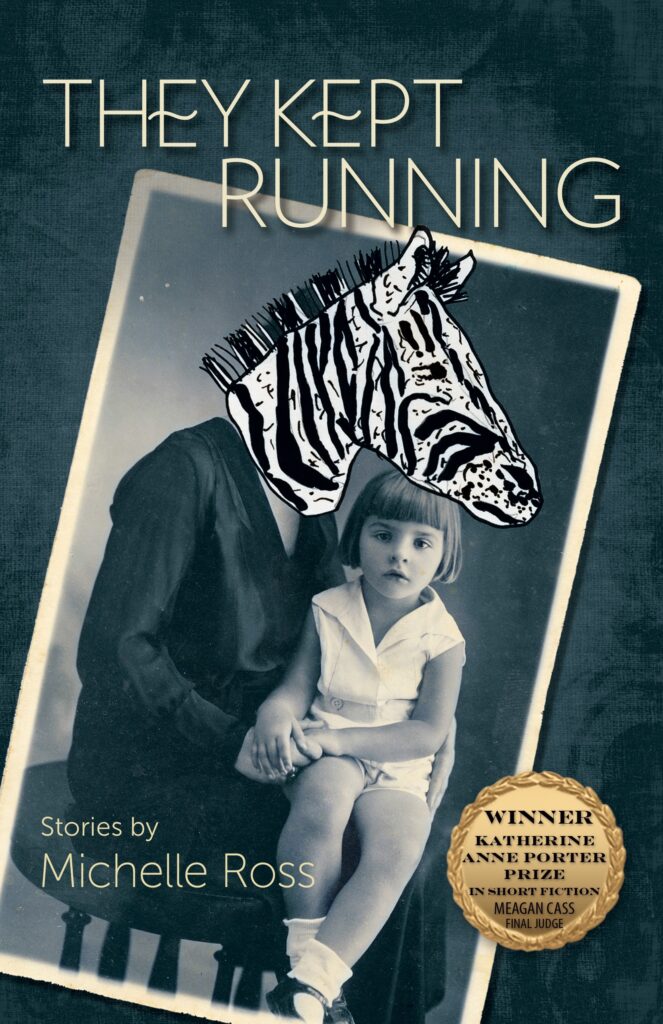Michelle Ross inspired me to start writing fiction again. I met her nearly a decade ago at our mutual workplace and we quickly sniffed out our common love of fiction and became friends. On our twice-daily walks, through instant messaging and occasional happy hours, we talked everything writing: We analyzed other people’s stories, picking apart language and technique. We discussed drafts and drafts of her stories. She let me see inside her writing practice: what worked, what didn’t. She provided insight into the new-to-me world of online literary magazines. She became the fiction editor of Atticus Review and brought me on to assist.
About mid-2015, Michelle hit her stride as a fiction writer. She started giving me several drafts a month to comment on, and these stories got accepted for publication quickly, over 30 in the last year and a half. I was no in the least surprised when she told me she had won the 2016 Moon City Short Fiction Award for her collection, There’s So Much They Haven’t Told You.
Interview:
Eleanor Gallagher: The title of your book captures a theme in many of your stories: childhood’s the loss of innocence, the discovery that one has not been told the whole story. I’m thinking of the protagonist in “Atoms” in particular. Why is childhood such a potent mine for you?
Michelle Ross: I’m not sure that I know why. I recall well, starting at a very early age, feeling humiliated and outraged when adults, or sometimes older kids, patronized or underestimated me because I was a child. Children are much smarter and more capable than a lot of adults give them credit for. For me anyhow, not being given that credit, being treated as less than, felt like a terrible injustice.
But also I’m thinking here about how knowledge is generally acquired. In “Atoms,” when the protagonist asks her teacher why she only just now told the students about atoms, the teacher says that they hadn’t gotten to that unit in science class. There’s a practical reason for the omission.
But for the protagonist, the discovery of atoms is earth-shattering. So much of what we eventually learn about life and the world and, oh god, our family members, is earth-shattering. Growing up is a process of learning to re-see again and again and again.
Writing is a similar discovery process. I sit down thinking I know something about the story I want to write or that I know what meaning I draw from a particular moment or image, but then through the process of writing, I discover so much I didn’t see before, or at least that I didn’t see as clearly. The story evolves, and I evolve with it. This discovery, and evolution, is one of the great pleasures of writing.
Sometimes the truths discovered in writing, as in growing up, may be unsettling. Maybe because they’re truths we’ve hidden from or feared for so long. Those are probably the most important truths, the ones we as writers should absolutely follow.
In “Unit 7: Exploring Fossils,” you used an event from my life, the time I almost lost my front tooth in a bike accident . One word you used, “pluck,” changed the way I saw my mother. Is there an example you’re willing to share where you wrote about an incident in your life that changed the way you saw or felt about another person?
 I’m often trying to challenge myself to better understand people through fiction, whether it be people who are close to me or just certain types of people or certain experiences. There are several examples that come to mind immediately, but I’m hesitant to divulge them because they involve family members who may find it hurtful to see themselves referred to so explicitly even if the point is that writing has made me feel compassion for them. In fiction, I think it’s fair to write about just about anything; in nonfiction, I feel it’s perhaps important to protect the privacy of the living.
I’m often trying to challenge myself to better understand people through fiction, whether it be people who are close to me or just certain types of people or certain experiences. There are several examples that come to mind immediately, but I’m hesitant to divulge them because they involve family members who may find it hurtful to see themselves referred to so explicitly even if the point is that writing has made me feel compassion for them. In fiction, I think it’s fair to write about just about anything; in nonfiction, I feel it’s perhaps important to protect the privacy of the living.
I know you are terrified of snakes, yet you write about cottonmouths and rattlesnakes, among other frightening things like serial killers.
I totally have nightmares about snakes, yes, yet at the same time, I’m fascinated by them, because they frighten me. I like looking at them from the other side of a pane of glass. I enjoy them in the wild too, up to a point. (I’ve had several close encounters with rattlesnakes here in Tucson–three times while out running alone, another time in my own backyard. I almost stepped on that one while I was running out to collect chives from my garden.) I’m drawn to what scares me, hence my love of horror films. I think that’s partly because I enjoy the sensation of being scared. But also, I’m drawn to what scares me because I want to see past that fear, to see the object of my fear for what it really is. So often fear is driven by misunderstanding and ignorance.
The sympathetic Jaycee in “Rattlesnake Roundup” says of the snakes, “Leave them alone, and they won’t go out of their way to strike.” What causes you to strike, as a storyteller? Do you know what truth you want to explore when you start?
I think that a lot of my writing is born of things that bother me, that nag at me like an itch–injustices, lies, contradictions. For instance, I have little tolerance for people playing the victim, making excuses, not taking responsibility for their own actions and lives. I have little tolerance for people pretending not to see ugliness. Rarely does any good come from the lies we tell ourselves and each other.
As for what I set out to do when I begin a story, it’s not so direct for me as wanting to expose some particular lie or truth. Mostly I seem to start with smaller things–an image, a setting, a line of dialogue. It’s like a string I pick up and follow to see where it leads. Often I end up running in circles, getting knotted up, before I eventually find my way to the other end.
Is that why an idea or situation may move from story to story or transform through drafting? For example, the dust mites in the mattress bit: you worked with that idea in a couple of different ways before it found its home in “If You Were a Serial Killer.” How did you know it belonged with Lori, in her story?
I’m not sure I consider “If You Were a Serial Killer” to be a different story from the story the dust mite segment originally appeared in so much as a highly evolved descendant of the earlier story, its ancestor. I wrote the first draft of this story about eight or nine years ago, and yes, early on, the story was centrally about, on the surface anyhow, the interaction between a woman and the vacuum salesman she lets into her home soon after her husband dies. Over the years, I would pull this story out to work on it, only to shove it away again weeks later. I did this over and over again, revising it in small bursts. I cut paragraphs, wrote new paragraphs. I rearranged pieces of the story. I wrote multiple versions of the beginning and the ending. I changed the setting. I changed the protagonist’s occupation. I revised the story bit by bit, slowly over time, not so unlike the way species accrue mutations, eventually becoming entirely new species. Or maybe a better metaphor is James Whale’s imagining of the construction of Dr. Frankenstein’s creature; I was scavenging parts, discarding parts, trying to figure out how to breathe life into this creature. I worried sometimes that I was wasting my time on a dead story, that it would never really come to life. But at the same time, I couldn’t let the story go because I recognized that while the story as a whole felt flawed, it contained ideas and writing that were too provocative to give up on. You mentioned the dust mites in the mattress component, and that is the oldest component in the current story, but the story acquired other provocative moments over time too that I kept. Eventually, I more or less excised those parts I couldn’t get out of my head and threw the rest of the story away. Then I wrote new material that incorporated the components I’d kept from the earlier drafts. While the body of “If You Were a Serial Killer” looks radically different from those older drafts, I see a direct line of ancestry threading them together.
This isn’t the only story I’ve transformed so radically from the first draft to the final draft. I seem to revise more heavily than most writers I know. Sometimes I worry that my writing process is highly inefficient. I worry that I obsess over details not worth obsessing about. Recently, a writer friend said of another story I’ve been working on but am still dissatisfied with, “You know you could get this published right now, right?” But I’m not interested in publishing something just because it’s publishable. Maybe no story I write will ever be perfect, but that’s always the goal, I think. To feel satisfied that the story is as perfect as I’m capable of making it.
“Stories People Tell” was rejected over 30 times before it was published, a process that took a year or so. Some writers would take so many rejections as a sign that the story may need work, that it is missing something. But you stuck with “Stories.” How did you know it was “perfect” as it was?
I received detailed feedback from a few editors along the way, so I did actually make some minor revisions to the piece, but nothing big. I think I know that a story is as perfect as it’s going to get when I’ve set it aside long enough to have distance on it and come back to it and enjoy rereading it again and again without any nagging feeling of something being not quite right or, worse, dull or blah or false. Distance is essential to being able to determine that. From there, I follow my gut and try to be patient. There is so much subjectivity in how readers and editors respond to fiction. You and I have talked before about how sometimes we read a story in a journal and are flabbergasted that another editor liked (or loved) the story enough to publish it. There are stories submitted to Atticus Review that I’ve rejected and then later seen published elsewhere.
Years ago, when I was a less confident writer, perhaps I would have abandoned a story if it was rejected dozens of times, and maybe rightfully so, because I wasn’t then as tuned into my instincts. A reader would point out a problem with a story, and I’d realize I had been aware of the problem too but somehow I had still managed to ignore it. But these days, that happens a lot less often. So when an editor rejects a story I believe in, I trust that I just haven’t found the right editor/reader yet.
That said, this trust can be a fragile thing that I have to rebuild again and again. I do that by rereading the story. I’m obsessive-compulsive when it comes to rereading my writing. I’m not just talking about stories in progress, which it makes sense to reread, but finished stories, too, even published stories. Paranoia sets in over time. I worry I made terrible mistakes. I reread to find out whether that paranoia is warranted. After I decide that it isn’t, it’s only a matter of time before the paranoia sets in again, and I’m off to reread again.
I’m obsessive-compulsive when it comes to language altogether. Sentences get stuck in my head like a record skipping. It feels like the mental equivalent of plucking hairs from your head until you develop a bald patch.
When I first met you, you were struggling to write a novel. Then you started writing flash and became prolific as hell and seemed more satisfied with the process. Why does flash work so well for you?
I feel that what really made the difference for me in terms of becoming more prolific wasn’t so much a shift in what I write but how often I write. I know writers who can go for months at a time without writing and then launch right back into writing when they feel inspired or have more free time. It doesn’t work that way for me. I need to write daily or very close to it or else I kind of forget what I know about writing. And I feel panicky and impatient when I do finally write.
I do love flash fiction, yes. Compression forces one to get to the meat of the story. It’s very satisfying to read and write for that reason. However, I love writing longer stories as well. The difficulty is that the longer chunks of writing time that longer stories (and novels) seem to require is more challenging to come by, what with working full time and being the mother of a young child. I think a lot of prose writers, especially those of us who work and have families, are drawn to flash in part because it’s more practical than longer projects when writing time is limited. If all I have is an hour, or less, to write, it’s challenging to enter into the world of a longer story or a novel. I can use up that hour just getting re-acclimated.
The same goes for my reading time. I prefer short fiction to novels these days because I can finish pieces from beginning to end (e.g., during my lunch break, during my son’s basketball practice).
Also, I’m the kind of writer who likes to jump around from one story to another from one day to the next. Because I like to play around, experiment, not be tied down to one thing for too long. Flash fiction, and longer short stories to some degree, are well suited to that.
I don’t want to discount the fact that I also just really love short fiction, whatever its length. I’ve read quite a few perfect short stories. Novels not so much. I can’t understand why short fiction hasn’t become more popular with general readers, why it seems to be a genre that is appreciated only by writers of short fiction. There’s so much talk about how our attention spans have become shorter and whatnot, yet still the market for novels is so much greater than the market for story collections. Perhaps that will change in the not-too-distant future, though. Great Jones Street has a fabulous mobile app that gives readers access to so many great short stories. I like that they tag stories to help readers identify stories that may interest them and that they indicate approximately how long various stories take to read. Also, despite that I have stacks of books piled around my bedside table, I sometimes manage to find myself in a doctor’s office or whatnot with nothing good to read; but no more, since I always have my phone handy.
Why did you decide to get involved as fiction editor of Atticus Review?
Mainly, I wanted to give back to other writers. I felt kind of gross sending stories out again and again, asking others to read them and consider publishing them, but not offering anything in return. I don’t mean that as a judgment of people who don’t have the time or resources to be able to volunteer as an editor. A lot of my writer friends work in academia. They have heavy teaching loads, and they have children on top of that, so doing something like this just isn’t an option. I work full time, but my job is over at 4:30 or so; I don’t have to bring it home with me. Anyway, editing for Atticus Review has made me feel more at home and more connected to a writing community. And I’ve learned so much that has benefited my own writing. Like how crucial those first few paragraphs are. Like how a single clumsy sentence, especially if the piece is flash fiction, will put the reader off.
What are you most grateful for about being a writer?
Hmm. I imagine that later I will realize I forgot something important here, but what comes to mind now is that being a writer makes me attentive and present. That right there is a great gift. Also, being a writer has made me grateful for all kind of experiences, even pain and suffering, because pain can fuel beautiful art, and in turning pain into art, there is healing. Also, writers talk so much about how difficult writing is, and it is, but writing is pleasurable too. I do it because I love it, and because I feel sick if I don’t do it.







